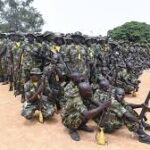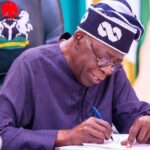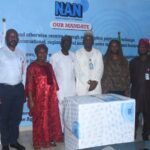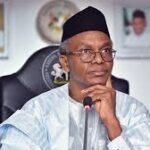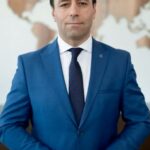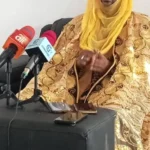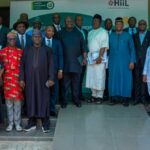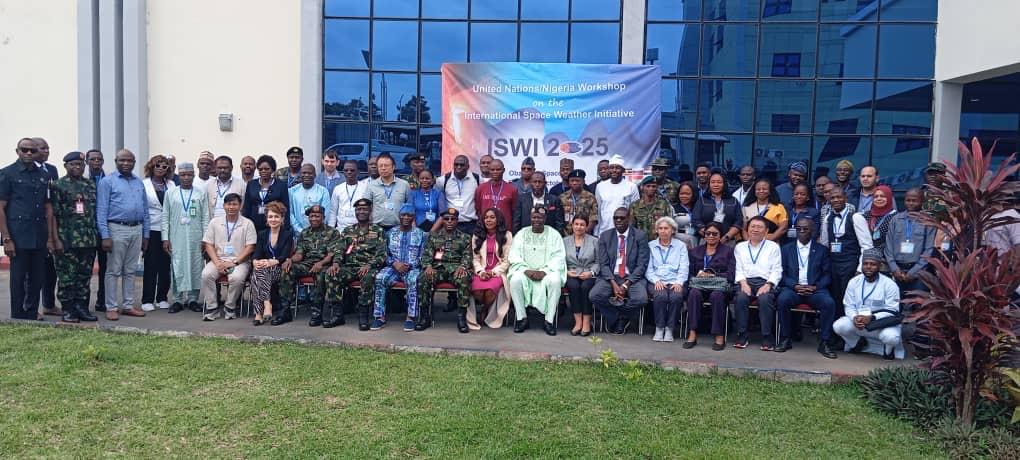By Ijeoma Olorunfemi
23 UN member states under the auspices of Office for Outer Space Affairs (UNOOSA) are exploring strategies, tools and means of acquiring accurate data for space weather monitoring and forecasting.
This is in a 5-day UNOOSA and Nigeria workshop through the National Space Research and Development Agency’s (NASRDA) on the International Space Weather Initiative (ISWI) in Abuja.
The workshop focused on Space Weather during a Moderate Solar Cycle 25.
Space weather during a moderate solar cycle signifies a period of relatively low, though not minimal, solar activity, characterised by moderate sunspot numbers, less solar flares and Coronal Mass Ejections (CMEs).
This could lead to occasional geomagnetic storms that cause visible phenomena and disrupt technological activities such as aviation communication, power grid and Global Positioning System (GPS).
Ms. Sharafat Gadimova, UNOOSA, Austria, said developing capabilities in space weather was one of many space activities UNOOSA supported members states.
Gadimova said the international community would explore strategies to improve the collection, exchange in delivering space weather data modelling, forecasting methods so as to enhance accuracy, reliability and interoperability.
“This community will also work to design a platform to identify user requirement and promote synergy between different communities addressing space weather impact.
“These activities will support capacity building, training, initiatives and providing data information on cutting-edge, up-to-date space weather research,’’ she said.
Dr Matthew Adepoju, Director-General of NASRDA, said space weather was a global phenomenon which required a collective international action because it was impacting technological infrastructure in orbit.
Adepoju, representing the Ministry of Innovation, Science and Technology, also drew the attention of global partners to the need of addressing extreme weather conditions like hurricane affecting parts of Africa.
“I will use this opportunity to call the attention of global experts on the platform of the ISWI to the paradigm shift that is needed to address the root cause of extreme weather impacts.
“It is of note that the extreme weather conditions usually expressed as hurricane, majorly from Sahara Desert in Africa, has brought damage to properties and lives across the Atlantic Ocean.
“This is an opportunity for scientists and global policy makers to shift attention to the root cause of most of the hurricane that takes its origin from Sahara Desert in Africa.
“We need to join hands for programmes such as Great Green Wall to become a successful initiative and address the causes of these disasters related to extreme weather conditions,’’ he said.
He pledged that Nigeria would be committed to spearheading activities to boost better weather conditions in Africa, improving operational analysis, modelling and forecasting methods in line with global best practices.
Adepoju, in his capacity, said that when sunspot groups released coronal mass ejections towards the Earth, it had negative impacts on high frequency radio communication, among other disruptions.
He said that developing and majorly African countries should take the impacts seriously and develop tools to address them.
“For developing nations such as Nigeria, and indeed the entire African continent which is advancing rapidly in digital transformation, our vulnerability to this phenomenon is growing.
“Our dependence on satellite technology for banking, telecommunication, broadcasting, weather forecasting and national security makes the understanding and prediction of space weather not simply a scientific theory,’’ Adepoju said.
Prof. Babatunde Rabiu, Chairman of the local organising committee for the workshop, said the ISWI was a programme of international cooperation aimed at advancing space weather science engaging a combination of instrument for analysis.
Rabiu further said the cooperation was responsible for developing the capacities in scientific discipline of Sun-Earth relations on space weather in many countries, thereby producing space weather literate communities.
He recalled Nigeria had been privileged to host previous UN workshops on basic space science in 1993, ISWI in 2011 and 2025, adding that it was another opportunity to build further capacity in the area.
Chief of Defence Space Administration, AVM Lanre Ibrahim, said the precision, reliability and security of satellite communication, positioning and survelliance systems were all essential to military operation and could be compromised by adverse space weather conditions.
“Understanding space weather is therefore, not only a scientific necessity but also a strategic imperative for mission success and operational readiness and national resilience.’’
The News Agency of Nigeria (NAN) reports that 23 member countries are participating in the conference with representatives from France, Germany, Japan, Cote’ Ivoire, South Africa, Brazil, India, Indonesia, among others. (NAN)(www.nannews.ng)

